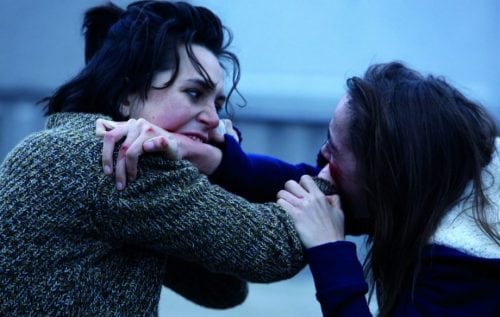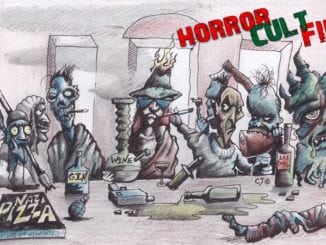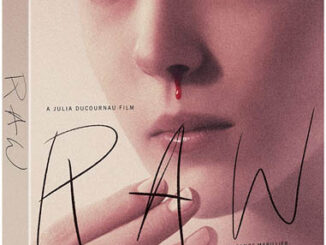
Raw is many things – it’s a touching coming of age, an exploration of sexual awakening and a dramatic tale of two sisters. It’s also excellent. But what it’s not is a big, gory, nasty shocker. This piece of misadvertising, and misleading word of mouth, is frustrating as it means the wrong audience may watch it (and be disappointed) while the right one may miss it. To discuss this, and set the record straight, Horror Cult Films joined a round table interview to speak with the very talented writer/ director Julia Ducournau about one of the most memorable debuts in years. Please note that some answers have been edited.
With such a big focus on the fainting stories, and the gore, over the coming of age plot this is one of the most misrepresented films I can think of. Has this experience been frustrating?
Yeah, but there’s nothing I can do about it. There’s kind of an urban legend about it that started in Toronto, and I personally saw it snowballing on the internet and was like ‘what the hell are they talking about?’ And at one point I realised they weren’t talking about my movie anymore – they were talking about another that doesn’t exist. Or if it does, it isn’t mine. I love mixing genres and I love balancing everything I do. I don’t like gratuitous violence – it bores me to death. And I think it’s too easy, so seeing it compared to torture porn doesn’t do it justice. But again, there’s nothing I can do about it. What makes me sad is some people will be too scared to see my movie when they could have handled it quite well.
What inspired you to make the film?
Many things – sometimes you have an image and you build up around it, but not this time. This was built over the course of reflection over years around the fear of the monster and the metamorphosis of bodies. Then I was talking with my producer about a cannibal movie, and it’s funny because I feel that cannibalism is the only taboo that movies still treat like it doesn’t exist. Like with murder and incest the perpetrators are represented as human beings so you don’t doubt it exists – there are psychopaths. But cannibals are always treated as ‘they’: an anonymous group always coming to attack our world – especially in the 70s when most of them were made. So I said I would replace the ‘they’ with ‘I’ and to try and make it a very realistic movie about someone who discovers these urges and cravings in her. So does this make her the monster? And how does she stay part of humanity. It was how I could explore the monster, who’s more human than those who call her a monster. And that’s what she is – she doesn’t hurt anyone. But the hazers are the real monsters, because they humiliate others. It’s about a positive monstrosity in the end – it’s better not to be part of that world, but to be like this.

Thinking more of the relationships than the plot, was any of the film autobiographical?
No, but I do think every film is. But not in the sense that it’s linked to a specific relationship or situation. I find myself in every character that I write. There’s a lot of me in both sisters, the father and Adrian. When I write a character, even if it’s a giant octopus with vampire teeth, I’m going to have to love them no matter what, so I need to find an entry point. This is how it’s autobiographical without being autobiographical.
It’s interesting how throughout there’s always an undercurrent of comedy with the horror.
For me it’s very organic. Hitchcock used to say there’s no suspense without laughter and I agree with that. Except I don’t play with suspense – I play with disturbance. So for me there’s no disturbance without laughter. I personally feel the need to laugh with a character from the beginning in order to identify with them – it creates a strong bond between the audience and the character because it’s such a physical reaction. I think it creates something that’s very intimate. It also helps with the interruption of genre in a way that you don’t get used to. So if you have a comedy scene after a traumatic scene it gives a release, but if you use it before then it puts the audience at ease and then you can get them. Laughter is great for leading on onto a rollercoaster. I also believe there’s no drama without laughter. I think I see life like this too, so it comes very naturally.
In terms of the coming of age what did you want to convey?
For me a coming of age can come at end age: it’s a turning point where you’re going to change physically and in your head. So for example, pregnancy, menopause or a loss of hair. So a turning point in your quest for identity. So in light of my choice to look at cannibalism it’s interesting that the character is 16 because it’s the first time in her life that she’s discovering sexuality and it’s the first time she’s confronted by the sense she needs to belong. Because when you’re out of home it feels like you have to – that it’s required. I don’t believe in belonging, I find it very claustrophobic, so that’s why I wrote this story of a girl who wants to belong but finds there’s something in her that says she can’t. And this is maybe for the best, because with the positive monstrosity why would you want to be with the hazers. In a way, doesn’t every film address this though? Is like the story of humanity.
The onscreen chemistry between Justine and Alexia was so strong – how did you find two actors that worked so well together?
With Garrance, I’ve been working with her for a long time – so that part was for her. For Alexia it took me a very long time to get to Ella. I saw a lot of actresses, but I never found this androgynous, warrior feel that I needed. Then I watched this Swiss-German movie she was in, where she played a skinhead, and she really blew my mind. So she came to Paris and Garrance would give lines to all the actors and this was when I got lucky. In real life Garrance is the youngest in her family and Ella is the oldest, and they have the same age difference as Justine and Alexia. Ella entered the room and I saw it – it was simple. I really believed in these two sisters. The others ones felt like they were playing the big sister, but with her I told her at the start Garrance’s body is her body and ‘you don’t need permission to move it or to push it’. Because this is really for me how I see siblings’ relationships – especially for the older one: you’re my toy’. And she really understood this, so there was no shame in the way they approached each other – they could touch, and she could slap her butt. I got lucky. But also I did a really good casting (laughs).

The soundtrack is one of the best I’ve heard in a long time – was it always something you heard when you were planning it?
At first I chose Jim Williams, whose work I discovered in Ben Wheatley’s movies, and chose him for him. Usually when you’re editing you put in some references to scores to get what you want, before you get the actual composer. So for me the references were his music so when he saw the first edit without his music, but with his music, he saw I wanted him and nobody else. I chose him because he’s an amazing instrumentalist and he’s got a very strong sense of building themes. I think it’s cool, because these are meant to be old school now but they’re in the golden age of Hollywood. We knew from the beginning we were going to go from an acoustic guitar, because I wanted something western like the discovery of the new world, and that this would then morph into an electric guitar as it got rougher. And then coming to the finger scene I told him I wanted the theme to morph into something that would give a sense that she’s doomed. That’s when he came up with the idea of keeping the theme but adding the organ over the electric guitar, which is smart because it’s the instrument of the church. Then in the football scene, where she becomes in full procession of her desires, he takes the same theme but replaces the organ with the harpsicord which is not religious at all – it’s very pagan. Which is perfect because now it’s someone becoming ok with what she feels. So we go from the sense she’s doomed to a pagan thing that says ‘fuck you, I’m ok with it’. So it was very smart – it was great working with him.
Would you be interested in tackling a similar story for a different perspective?
This story, no. But my movies, the ones I’ve done and will make, will always have the same themes: this quest for identity. A transgenre, transgender types of universality that I try to aim at. So I think it will always be there. Because, in the end, answering what it is to be human isn’t something I can do with one movie – it’ll be there my whole life because I’m trying to tackle a biggy.
Raw is at the cinema now.




Be the first to comment